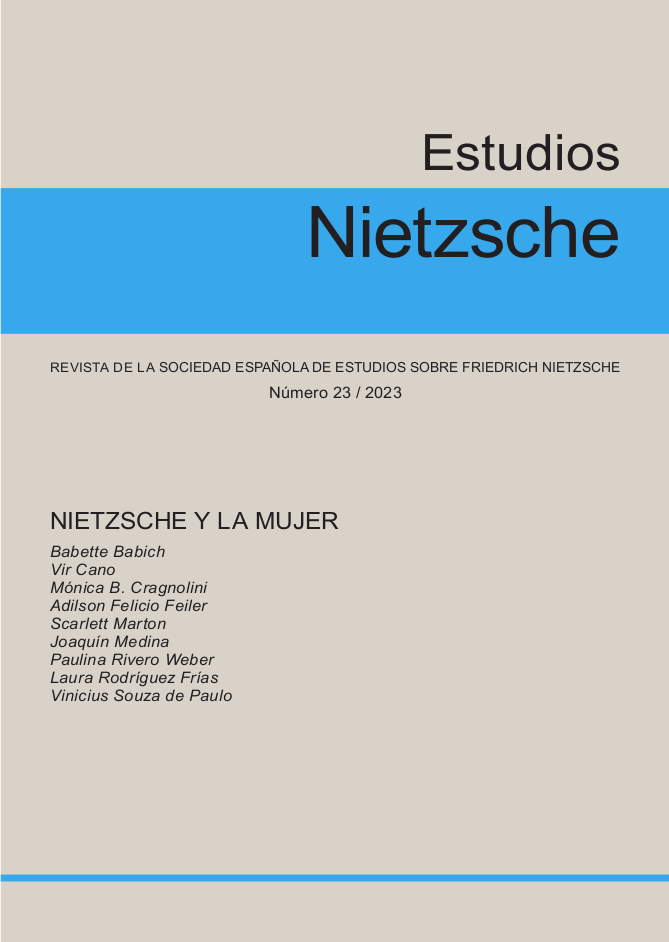The inner woman in Nietzsche-Zaratustra
DOI:
https://doi.org/10.24310/EstudiosNIETen.vi23.16012Keywords:
anima, analitical psychology, Zarathustra, transformationAbstract
The different types of affirmations that Nietzsche makes in his work about women have been understood and criticized from different points of view, attending not infrequently to the prevailing social assessment in each place and in each time, but this judgment of the spirit of the times, while very interesting and pertinent, is not really in keeping with the nature of Nietzsche's own work. We propose a reading of what women mean in and from Nietzsche's work, taking into account his own psychology, what it means to deal with the «inner woman» in the philosopher, mainly through some texts that speak about the woman extracted from Thus Spoke Zarathustra -especially from the end of its third part-, resorting to the study of Nietzsche's masterpiece by C. G. Jung, as well as his concept of the anima. Nietzsche's relationship with the inner woman opens a new way to understand the meaning of the philosopher's work.
Downloads
Metrics
References
BARRIOS, MANUEL. La voluntad de poder como amor. Madrid: Arena Libros, 2007
CIRLOT, VICTORIA. Ariadna abandonada. Friedrich Nietzsche trabaja en el mito. Barcelona: Alpha Decay, 2021
DELEUZE, GILLES. Crítica y clínica. Barcelona: Anagrama, 1996
JUNG, C. G. El Zaratustra de Nietzsche, 2 vol. Madrid: Trotta, 2019-2021
JUNG, C. G. Nietzsche’s Zarathustra: Notes of the seminar given in 1934–1939. 2 vol. London: Routledge, 1989.
JUNG, C. G. Obra completa, I-XVIII. Madrid: Trotta, 1999-2017.
LOEB, PAUL S. The death of Nietzsche ?s Zarathustra. Cambridge: Cambridge University Press, 2010
MARTÍN NAVARRO, ALEJANDRO. «Prefacio» a «Así habló Zaratustra», en
Nietzsche, Friedrich, Obras completas, vol. IV. Madrid: Tecnos, 2016, pp. 65-70
NIETZSCHE, FRIEDRICH. Correspondencia, 6 vol. Madrid: Trotta, 2005-2012
NIETZSCHE, FRIEDRICH. Fragmentos póstumos, 4 vol. Madrid: Tecnos, 2006-2010
NIETZSCHE, FRIEDRICH. Obras completas, 4 vol. Madrid: Tecnos, 2011-2016
NIETZSCHE, FRIEDRICH. Poesía completa. Madrid: Trotta, 2000
SALGADO FERNÁNDEZ, ENRIQUE. Cumbre y abismo en la filosofía de Nietzsche. El cultivo de sí mismo. Madrid: Plaza y Valdés, 2007
SCHWARTZ-SALANT, NATHAN. The borderline personality. Vision and healing. Wilmette: Chiron, 1989
STEIN, MURRAY. El mapa del alma según Jung. Barcelona: Luciérnaga, 2008
VON FRANZ, MARIE-LOUISE. Sobre los sueños y la muerte. Barcelona: Kairós, 2007
Downloads
Published
How to Cite
Issue
Section
License
As of issue 21 (2021) this journal is published only in open access (diamond route).
From that number 21, like the previous numbers published in NIETZSCHE STUDIES, they are subject to the Creative Commons Acknowledgment-NoComercia-ShareIgual 4.0 license, the full text of which can be consulted at <http://creativecommons.org/licenses/by-nc-sa/4.0 >
It is the responsibility of the authors to obtain the necessary permissions of the images that are subject to copyright.
This work is licensed under a Creative Commons Attribution-NonCommercial-ShareAlike 4.0 International License.
Copyright generates two different rights: moral rights and patrimonial rights that EJFB recognizes and respects. Moral rights are those relating to the recognition of the authorship. They are rights of a personal nature that are perpetual, inalienable, unseizable and imprescriptible as consequence of the indivisible union of the author and his/her work.
Patrimonial rights are those that can be derived from the reproduction, distribution, adaptation or communication of the work, among others.







11.png)
